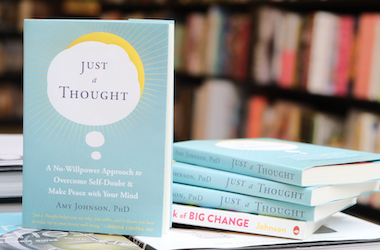One of the biggest obstacles to hearing something insightful and helpful is what I call ‘turning to the hows’. 
Imagine we’re talking; just chatting it up about life. Maybe you’re telling me about the strong cravings you have for a drink at 3 o’clock every afternoon, or you’re telling me about your panic attacks, or that you can’t seem to stop obsessing about losing all your money.
And maybe I share how your cravings, anxiety, worry look to me, from an outside perspective—like non-threatening, non-dangerous, totally normal experience that shows up for all of us in different ways, at different times. I might (we’re just pretending here) share something about how I came to see my own cravings, anxiety, or worries in a way that ultimately changed my experiences with them.
So there we are, just chatting it up about life. You’re poised to hear something new because we’re talking about new things you may not have seen before.
And here’s where I see people throw it all away, very innocently, of course. They turn to the hows:
- How do I see it that way?
- My anxiety must be different than yours because I can’t imagine how I could possibly be okay with it.
- I don’t know how to see my cravings any differently than I see them now—can you teach me how?
- What am I supposed to do? (Okay, this isn’t technically a how, but it may as well be).
Even when they don’t explicitly ask these questions, I can often tell that’s where they are mentally because of the silence and confusion. As we’re just chatting it up, there’s a bit of hope, some curiosity, some true hearing…then silence. Hopelessness. Confusion.
See, when you’re in the conversation about life in a very open, casual way, your mind starts to relax a bit. The barriers in your mind start to melt–there’s no position to erect barriers against.
There’s nothing to evaluate or potentially adopt. It’s just a conversation about how two people are seeing some aspect of life.
From that place, you’re in a good position to hear something new; something that lands deeply and leads to a shift.
But we’re not all that used to that place. We forget it’s that easy. We’ll fix this problem, we think. We’ll figure this one out. I got this.
So we go mentally rigid again and flip into mental problem solving mode, searching for answers to our how questions.
I know it’s difficult to avoid, and I know you’re mind’s going to go there. Mine does too.
But know that it’s not helpful. If you see that insights are more likely when you’re just in the casual chat, open and exploring, not trying to solve it all, you’re less likely to hang out in the hows when you do find yourself there.
See if you can notice the tense, heady feeling that often accompanies turning to the hows, and let that feeling guide you back into the casual conversation.
You’re far more likely to hear something new that way.





